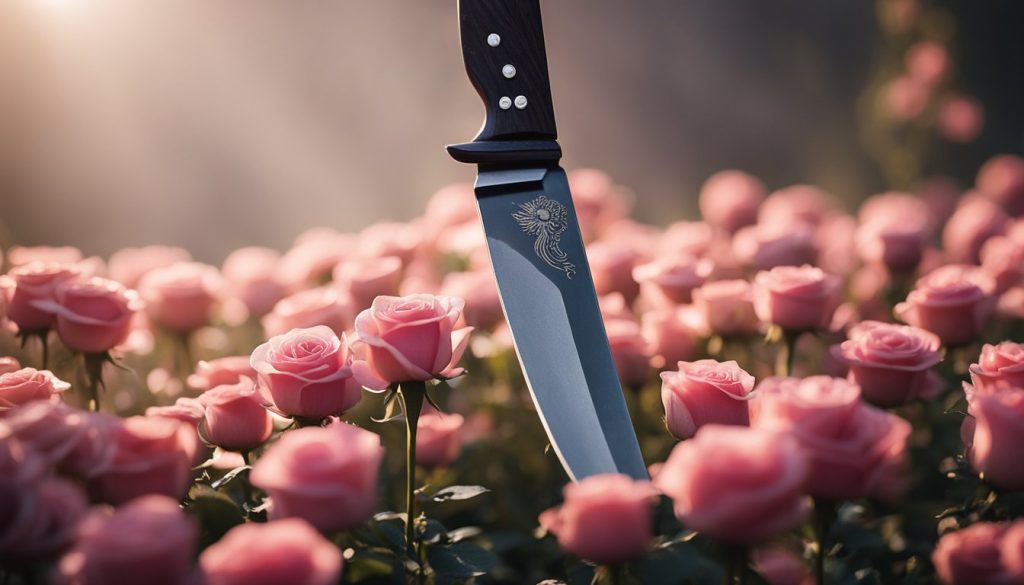Knives have been more than just tools throughout human history. They symbolize power, danger, and survival, and carry significant weight in cultural and spiritual contexts.

Imagine the knife as a double-edged symbol. On one side, it represents defense and protection, while on the other, it can signify aggression and control. This dichotomy makes knives fascinating subjects in art and mythology.
In daily life, knives often appear in our dreams, literature, and even in our speech, symbolizing various human emotions and states of mind.
Next time you see a knife, consider what it might symbolize beyond its practical use.
Key Takeaways
- Knives symbolize power, danger, and survival.
- They represent both protection and aggression.
- Knife symbolism permeates art, mythology, and daily life.
Cultural and Historical Significance
Knives have been integral to human culture and history for millennia. They’re more than just tools and weapons; they carry symbolic weight across various societies and epochs.
Ancient Rituals and Ceremonies
Knives played crucial roles in ancient rituals and ceremonies.
In ancient Egypt, priests used ceremonial knives for sacrifices and religious rites. The keris, a traditional dagger from Southeast Asia, is considered to have mystical properties and is often used in spiritual ceremonies.
In some cultures, particular knives were believed to ward off evil spirits. These practices highlight the knife’s pivotal role in connecting the physical and spiritual realms.
Native American Culture
For Native American tribes, knives were not just tools but sacred objects.
The Lakota Sioux used knives in their Sun Dance ritual, symbolizing bravery and sacrifice. In some tribes, knives were handed down as heirlooms. They often featured ornate handles made from bone or wood, inlaid with beads and feathers. These knives were seen as symbols of honor, courage, and survival.
Japan and the Samurai Tradition
Japan’s samurai warriors considered the knife, particularly the katana, to be an extension of their soul.
Samurais used tanto and wakizashi knives for close combat and ritualistic seppuku (honor suicide). These knives were meticulously crafted and symbolized the samurai’s code of honor and discipline. The artistry involved in forging these blades is revered, with techniques passed down through generations.
Knives in Literature and Mythology
Knives often appear in literature and mythology, symbolizing power, protection, or betrayal.
In Greek mythology, Perseus used a divine knife to slay Medusa. Arthurian legends speak of Excalibur, a sword with mystical powers. In modern literature, knives can represent a character’s internal struggles or moral decisions.
Ever read The Lord of the Rings? Frodo’s journey is closely tied to his elven knife, Sting. These stories remind us of the knife’s enduring presence in human imagination.
Symbolic Meanings of Knives

Knives have been used throughout history to represent various concepts in different cultures. Their sharp edges and practical uses imbue them with powerful symbolic meanings related to power, authority, protection, defense, sacrifice, betrayal, division, and separation.
Power and Authority
Knives often symbolize power and authority. In ancient cultures, the possession of an ornately decorated knife was a status symbol.
Think of tribal leaders and royalty who wielded these weapons not just for combat but to signify their power. Some cultures even awarded knives to warriors as a mark of honor and bravery.
In modern times, knives are still associated with authority. For instance, military officers often carry ceremonial daggers.
In cooking, a chef’s knife symbolizes skill and expertise. Knowing how to use a knife deftly is equated with control and mastery in various professional and personal settings.
Protection and Defense
Knives serve as tools for protection and defense. In both historical and contemporary contexts, carrying a knife has been a means of safeguarding oneself.
For example, hunters rely on knives for survival in the wilderness, and many people carry pocket knives for personal safety.
Besides physical protection, knives also symbolize mental preparedness and keen instincts.
Think of how a knife can cut through obstacles or threats, representing sharpness of mind and readiness to face challenges.
This symbolism extends into literature and cinema, where protagonists often brandish knives to defend themselves and others.
Sacrifice and Betrayal
Knives carry heavy connotations of sacrifice and betrayal. In historical rituals, knives were often used in sacrifices, both animal and human, to appease deities. This act symbolizes giving up something valuable for a greater cause.
On the darker side, knives are also linked to betrayal.
The phrase “stabbed in the back” stems from the literal act of betrayal using a knife. Famous historical events and literary works, such as the assassination of Julius Caesar, where he was stabbed by his trusted allies, reinforce this association. The knife becomes a potent symbol of treachery and the ultimate breach of trust.
Division and Separation
Knives are tools for division and separation. They can split objects, carve pathways, and even cut ties.
In the culinary world, knives are essential for preparing food, illustrating how they create order from chaos by dividing ingredients into manageable parts.
On a symbolic level, knives represent the act of making clear distinctions or decisions.
For instance, “cutting through the noise” means making sense of confusion. In relationships, a knife might signify a breakup or the end of a partnership, severing ties that once united individuals. The sharp edge of a knife makes it an apt symbol for decisive action and clarity.
Spiritual and Emotional Dimensions

Knives carry profound spiritual meanings and symbolic depth. Understanding these dimensions helps you appreciate their role in faith and emotions across different cultures.
Spiritual Meanings and Interpretation
Knives often embody spiritual symbols tied to protection and purification. In various cultures, knives are seen as tools that can cut through negativity or evil influences.
For instance, in some religious ceremonies, knives are used to symbolically sever negative energies.
In folklore, a knife placed under a pillow is believed to ward off nightmares and evil spirits. Tibetan Buddhism uses ritual knives, known as “phurba,” to represent the cutting of ignorance and obstacles on the spiritual path.
Knives also have a dual nature: protection and aggression. This duality reflects the balance between good and evil. They symbolize discernment, cutting through deception to reveal the truth.
Emotional Significance and Symbolism
Knives evoke powerful emotions such as fear, courage, and strength. They can symbolize a turning point or significant change.
For some, a knife represents a painful but necessary action to remove distress or unhealthy elements from life.
In literature and media, knives often symbolize betrayal or protection, impacting how characters and stories develop.
A knife handed down through generations can hold sentimental value, embodying family heritage and personal history.
Knives can also manifest emotions like anger or hostility, yet they also symbolize healing in surgeries and medical practices. This complex emotional symbolism makes knives a profound and multifaceted symbol in human experience.
Knife Symbolism in Daily Life

Knives play a vital role in our daily lives, embodying both practicality and deeper symbolic meanings. They represent utility, craftsmanship, personal growth, and the challenges we face.
Utility and Craftsmanship
In daily life, knives are indispensable tools. A well-made knife reflects the skills of the craftsman and stands as a symbol of precision and reliability.
You rely on knives for countless tasks, from slicing fruits to intricate woodworking.
The craftsmanship in knife-making involves choosing the right materials, such as high-carbon steel or ceramic, to ensure durability and sharpness.
Consider how a meticulously crafted chef’s knife makes food preparation smoother and more enjoyable. The balance and sharpness can make chopping vegetables feel almost effortless.
Culinary Arts and Practices
Knives are essential in the culinary world, where they symbolize precision and creativity. Chefs view their knives as extensions of their hands.
Imagine preparing a meal without a knife – nearly impossible, right?
Whether you’re dicing onions, filleting fish, or carving a roast, each task requires a different type of knife, tailored for specific purposes.
Pairing the right knife with the task at hand not only enhances efficiency but also contributes to the quality of your dishes.
A sharp, versatile knife elevates your cooking experience, allowing you to express your culinary skills better.
Personal Growth and Challenges
Knives also symbolize personal growth and the obstacles you overcome. Learning to handle a knife safely and effectively can be a rite of passage.
Think about your first attempt at carving wood or tackling a tough cut of meat. These experiences teach patience, precision, and confidence.
Facing the challenges of knife skills can mirror life’s personal growth journeys. Each slice or carve symbolizes pushing through barriers and achieving mastery.
Interpreting Knife Imagery

Knives can evoke various emotions and signify different things depending on the context. Whether seen in dreams, art, or interpreted through psychological perspectives, knives represent deep, often complex aspects of the human experience.
Dreams and Subconscious
Have you ever dreamt of a knife? It can be pretty unsettling, right?
Knives in dreams often symbolize conflict, aggression, or a need to cut something out of your life. According to Jungian psychology, these dreams tap into our subconscious fears and desires.
For example, dreaming of being chased with a knife might suggest you’re avoiding a pressing issue. Conversely, holding a knife could symbolize your power to take control.
It’s fascinating how our minds use such imagery to communicate deeper feelings and conflicts.
Art and Symbolism
Artists have used knives in their work for centuries. You might notice them in paintings, sculptures, or even contemporary media. They aren’t just a tool; they’re loaded with meanings.
In Renaissance art, knives often symbolize sacrifice and martyrdom.
In modern art, they might represent the artist’s inner turmoil or societal issues. A classic example is Caravaggio’s “Judith Beheading Holofernes,” where the knife symbolizes liberation and justice.
Artists use knives to invoke strong emotions and provoke thought, making them a powerful symbol.
Psychology and Personal Boundaries
Knives also have a place in psychological contexts, particularly in discussing personal boundaries.
Ever hear someone say, “that cuts deep”? They’re not talking about a literal knife. Instead, they’re referring to an emotional wound.
In relationships, a knife might signify the need to protect oneself or establish clear boundaries. This can be especially important in therapy, where understanding this imagery helps process personal experiences and trauma.
It’s about recognizing the power and impact of symbolic tools in shaping our emotional landscape.
The Dual Nature of Knife Symbolism

Knives have always held a deep and complex symbolism. They intertwine themes of life, death, healing, aggression, freedom, and control.
Life and Death
Knives are powerful symbols of both creation and destruction. In ancient rituals, they’ve been used in sacrifices to both give and take life. Think of the surgical knife. It saves lives through precision and care, yet in a different context, the same knife can end a life with a swift cut.
In literature and mythology, knives often bear the weight of fate. For example, in Greek mythology, the Fates use knives to cut the thread of life. Hence, knives embody life’s fragile and transitory nature.
Healing and Aggression
Did you know a knife can be a healer? Surgeons use scalpels to perform intricate operations, showcasing the precision and care involved in healing. Knives in medical practices symbolize meticulousness and the line between life-saving actions and harm.
On the flip side, knives also represent aggression and violence. From street fights to fictional tales, knives are weapons wielded in anger. This duality illustrates how context changes the knife from a tool of healing to an instrument of violence.
Freedom and Control
Knives can symbolize freedom or taking control over one’s life. For instance, a knife might be used to cut ropes that bind, symbolizing the release from captivity or oppression. In survival scenarios, a knife provides the autonomy to build shelter, hunt, and defend oneself, serving as a lifeline to freedom.
However, knives can also represent control. Historically, they’ve been used to instill fear and obedience. In culinary arts, chefs wield knives to masterfully take control of their environment, demonstrating skill and precision.
Universal Themes and Reflections

Knives are more than just tools; they hold significant meanings and symbolism that reflect human experiences, conflicts, and progress.
Human Experience and Society
Knives have played a crucial role in human society since ancient times. They are symbols of survival, craftsmanship, and daily life. Think back to when people first crafted knives from stone; it marked a major step in evolution.
In modern times, they continue to be essential in various cultures. For instance, in some ceremonies, knives symbolize protection and strength. Whether it’s a chef’s knife in the kitchen or a craftsman’s tool, the knife remains integral to humanity’s daily activities.
Additionally, knives often reflect societal values and norms. For example, gifting a knife in some cultures is considered symbolic, representing the need to “cut” the ties of the past and move forward.
Conflicts and Resolutions
Knives also symbolize conflict and resolution. Historically, they have been used as weapons in wars and disputes. Their sharpness often represents the intense nature of conflicts. However, with conflict often comes resolution.
During medieval times, duels involving knives were a way to resolve disputes and uphold honor. In literature and film, knives often serve as dramatic symbols of danger, tension, and eventual resolution.
In the judicial system, forensic analysis of knife wounds can lead to justice and resolution of criminal cases. Thus, while they may embody conflict, they also hold a crucial role in enforcing justice and bringing about solutions.
Transition and Progress
Knives are also powerful symbols of transition and progress. They are tools of transformation, whether it’s carving wood into art or preparing food.
In rites of passage, such as a young person’s transition to adulthood, knives can symbolize the cutting away of the old to embrace new responsibilities. For example, the Maasai warriors of Kenya are given ceremonial knives during initiation rites, symbolizing their transition to manhood.
The evolution of knife technology—from stone to bronze and steel—also mirrors human progress and technological advancements. As technology continues to develop, knives become more specialized, reflecting the continuing journey of human innovation.
Practical Uses and Symbolic Functions

Knives hold a unique place in both practical applications and as symbols. From survival tools to crafting aids, knives serve various essential roles while also representing deeper cultural and personal meanings.
Survival and Adventure
When you’re out in the wild, a knife is indispensable. It helps you cut through dense foliage, prepare food, and even build a makeshift shelter. A study by the American Survival Institute found that 95% of survival experts consider a multipurpose knife crucial.
In adventure sports like outdoor trekking, climbers use knives for safety measures, like cutting ropes in emergencies. Knives are not just tools; they are lifelines, giving you the edge in challenging situations. Having a reliable knife can be the difference between an enjoyable adventure and a risky ordeal.
Crafting and Creating
Knives are vital in various crafting and creating processes. Woodworkers use specific carving knives to create intricate designs and sculptures. In leatherworking, a precise blade ensures clean, straight cuts to produce high-quality items.
Artists often rely on knives for detailed work. Even in culinary arts, chefs use specialized knives for different cutting techniques to enhance their dishes. The famous artist Michelangelo once said, “Every block of stone has a statue inside it, and it is the task of the sculptor to discover it.” This highlights the knife’s role in unveiling creativity.
Modern Utility and Customary Traditions
In today’s world, knives continue to serve essential utility roles. Utility knives facilitate daily tasks from opening packages to DIY home projects. Swiss Army knives are popular for their multi-tool functionality.
Knives also hold a significant place in various ceremonies and traditions. For instance, Japanese culinary customs emphasize the use of specific knives for different types of fish preparation. In some cultures, ceremonial knives are used in rites of passage or as family heirlooms, symbolizing heritage and craftsmanship.
Concluding Remarks

You might not think about knife symbolism every day, but it plays an intriguing role in many cultures.
Knives often represent clarity and discernment. When making tough decisions, they symbolize the need to cut through confusion for clear choices.
Knives can also mean balance. Just imagine the precise movement required to use one. Respect the trust between the user and the tool.
Ever felt the need for letting go? A knife can symbolize that too—letting go of what no longer serves you.
Friendship can relate to knives as well. Some cultures believe gifting a knife can sever ties, while others create closer bonds through a “payment” ritual.
Understanding these varied meanings enriches your perspective. It’s intriguing how one object can carry so many layers of significance.



